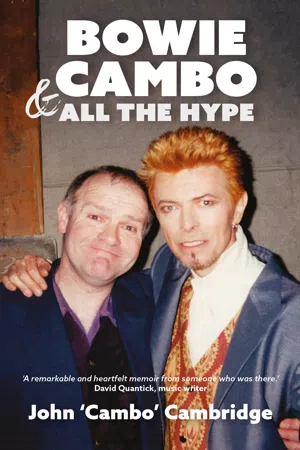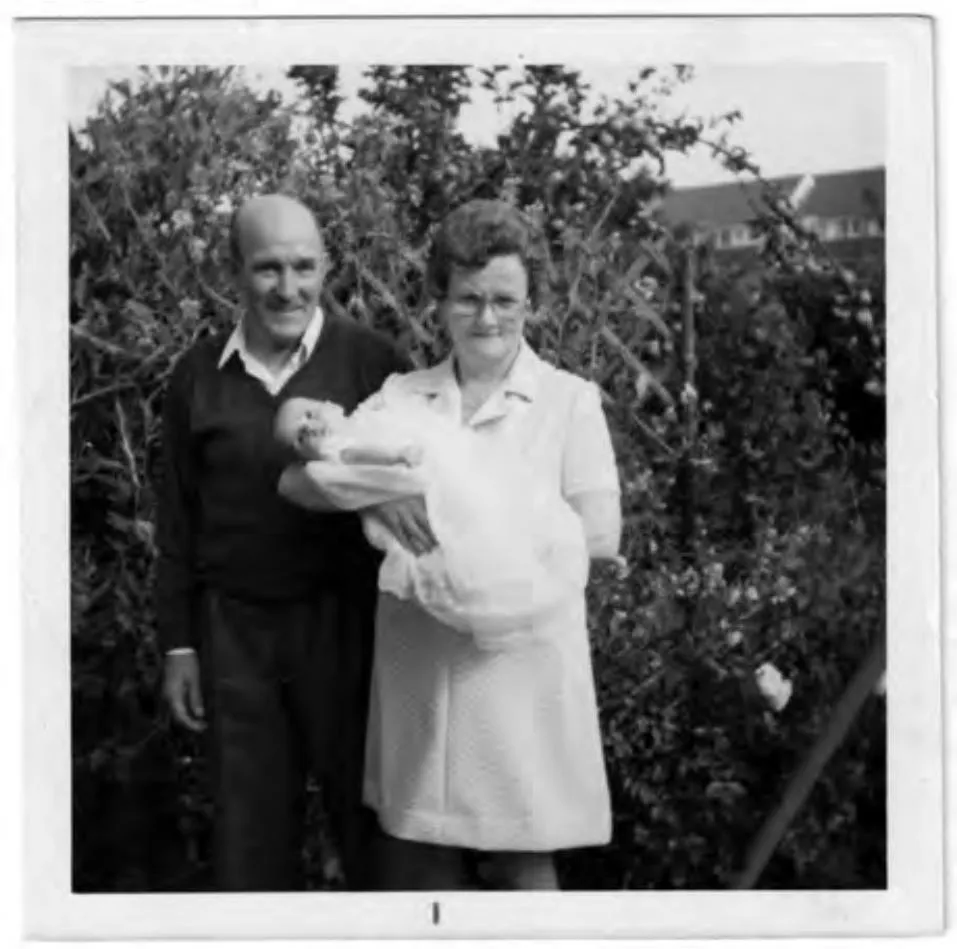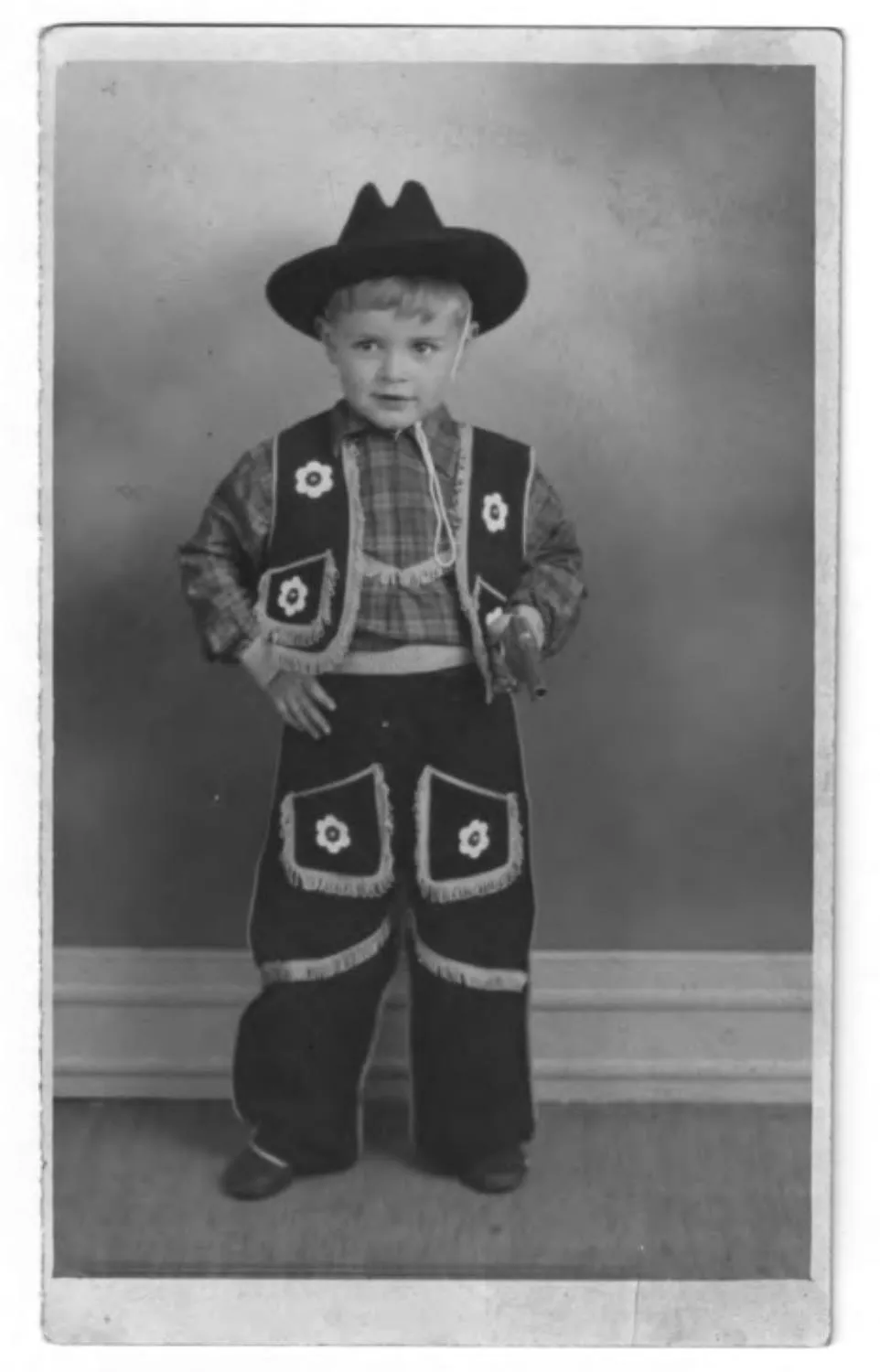
eBook - ePub
Bowie, Cambo & All the Hype
John Cambridge
This is a test
- 192 pages
- English
- ePUB (mobile friendly)
- Available on iOS & Android
eBook - ePub
Bowie, Cambo & All the Hype
John Cambridge
Book details
Book preview
Table of contents
Citations
About This Book
In Bowie, Cambo & All the Hype we get a backstage pass to key people and events during those crucial early years. This is a heartfelt story of a unique friendship.
Drummer, musician and friend John 'Cambo' Cambridge lived with Bowie at Haddon Hall when he had his first hit record 'Space Oddity' and toured with him in Junior's Eyes. He was there for him at many key moments – when Bowie lost his father, passed his driving test, played his first Glam Rock gig with Hype, even acting as best man when Bowie married Angela Barnett in 1970. And if John had not persuaded his former Rats colleague Mick Ronson to join Bowie in February 1970, there might never have been a Ziggy Stardust or the stellar career which followed.
Frequently asked questions
How do I cancel my subscription?
Can/how do I download books?
At the moment all of our mobile-responsive ePub books are available to download via the app. Most of our PDFs are also available to download and we're working on making the final remaining ones downloadable now. Learn more here.
What is the difference between the pricing plans?
Both plans give you full access to the library and all of Perlego’s features. The only differences are the price and subscription period: With the annual plan you’ll save around 30% compared to 12 months on the monthly plan.
What is Perlego?
We are an online textbook subscription service, where you can get access to an entire online library for less than the price of a single book per month. With over 1 million books across 1000+ topics, we’ve got you covered! Learn more here.
Do you support text-to-speech?
Look out for the read-aloud symbol on your next book to see if you can listen to it. The read-aloud tool reads text aloud for you, highlighting the text as it is being read. You can pause it, speed it up and slow it down. Learn more here.
Is Bowie, Cambo & All the Hype an online PDF/ePUB?
Yes, you can access Bowie, Cambo & All the Hype by John Cambridge in PDF and/or ePUB format, as well as other popular books in Médias et arts de la scène & Biographies de musique. We have over one million books available in our catalogue for you to explore.
Information
Subtopic
Biographies de musiqueChapter 1
MY HOME AND MY FAMILY
My family come from the North of England. Marjorie Mary Getliffe, my mother, was from Manchester and Tom Cambridge, my dad, from Goldthorpe, a small mining town between Doncaster and Barnsley – just ten miles from where David Bowie’s father, Haywood Stenton ‘John’ Jones was born, five years earlier than dad in 1912.
I often wonder, and others have speculated too, if maybe David felt the Yorkshire ‘Northern’ connection between us and that’s one of the reasons we got on so well. It does seem a bit of a coincidence that so many other people involved with his early career came from Yorkshire too, including his Feathers bandmate John ‘Hutch’ Hutchinson; Trevor, Mick and Woody, the three Spiders from Mars; and Bowie’s former bodyguard Stuey George, who was also our roadie in the band The Rats and whom I still see occasionally.
Even Gary Miller who produced the track ‘Everyone Says “Hi”’, a much later Bowie hit from the Heathen album, was a Hull lad too. Later in the book I will describe the time David and Angie Bowie came ‘up north’ to stay with us in our little flat in Hull and my parents’ reaction to that.
Mam and Dad met while they were in the army and were married in Salford just after the Second World War. My brother Ken was born on 25 May 1946. I was born down Albany Street on Spring Bank in Hull on 8 May 1949.
Dad originally moved to Hull with his elder brother Bill after the Second World War as the city had been badly bombed in the Blitz. He was a plasterer by trade and there was plenty of work to be had rebuilding the city.

Dad and Mam Cambridge with son Aaron

John with brother Ken
I remember Dad telling me all these amazing stories about the war, and how, as a prisoner of war in Italy, he had escaped, only to be captured and then to escape again. I was always saying to him, ‘You ought to write a book about your life.’ It seemed to be just one adventure after another and something which was actually worth writing down.
His answer was much the same as mine used to be (‘I can’t be arsed!’) even though his achievements were far more notable than mine. Mine are mostly about music, football, running pubs or working on building sites, not to mention the all-important family life.
I often wonder about what my Dad had to do when he was 22, the year the Second World War broke out, compared to what a typical 22-year-old has to do nowadays and compared to what I’d done by that age – virtually nothing.
Dad was a massive influence on my life and if he was still around, he would no doubt give his own, typically down-to-earth take on the Bowies’ stay with us in Hull: how they ran up a big telephone bill, smoked his fags and how he may have provided David with inspiration for some of his most famous lyrics.
One thing I will always remember about Dad is that he was an avid reader; mostly paperback novels, potboilers, cowboy stories, war sagas, etc. which he used to buy from the West Hull Bookshop near Madeley Street off Hessle Road. My mam would go and collect five or six at a time, at a shilling a book, and when he’d finished she’d take them back and swap them for five or six more.
She kept doing this for years to the point where nobody knew what he’d read and what he hadn’t. Sometimes I’d go shopping with her on Hessle Road, pick up a book and ask: ‘Has he had that one, Mam?’, only to find when we got back that he’d usually already read five out of the six we’d got for him.
If he knew I was writing a book, he would probably say something like: ‘Son, you don’t have to put big words in a book to make it interesting; big words like “wheelbarrow”, “lighthouse” and “marmalade”. And don’t forget, never use a big word when a diminutive one will suffice’. (As you can see, I inherited my dad’s sense of humour.)
Dad died in 1981 – if he somehow finds out I need a ghost writer, I’m sure he’ll be the first to be in touch.
Sense of humour was another one of the reasons David Bowie and I got on so well, and our South Yorkshire fathers would probably have enjoyed a pint together and had a lot in common too.
We lived in a couple of other bedsits after Albany Street, before eventually moving into a council flat into Brisbane Street, in 1954. We were within easy walking distance of both the city centre and the shops and pubs of the famous Hessle Road trawling and fishing community, which was Hull’s main industry at the time.
Our flat was brand new in a three-storey block; we were its first tenants.
Although it was modern, it didn’t have many modern facilities. There was no central heating, just one coal fire in the lounge with a back boiler attached, which meant if you wanted hot water you had to pull the damper out under the fire to heat the water. In winter the bedrooms could get pretty cold and even though my mam and dad had a little two-bar electric fire, they would normally only ever have one bar on to save money.
And these were the days when you had to put a shilling in the meter too. It was less than ten years after the Second World War and the devastation, especially in Hull and within striking distance of the docks, was still to be seen on the streets all around in the rubble and the bombed buildings.
Dad’s army gear was still about the flat too, especially his tin hat and great army overcoat. My brother Ken and I used to share a bed then, as brothers often did; a big metal frame with springs that could be bounced up and down on like a trampoline. In cold winter weather, we’d sometimes get frost on the inside of the window and Mam used to put Dad’s army greatcoat on the bed as a top cover for extra warmth.
One night when we’d gone to bed, I shouted through to her, ‘Mam, our Ken’s pulling the big coat over to his side and he won’t give me any of it!’ She came rushing in.
‘Will you be quiet!’ she said. ‘Your Auntie Maud’s here.’ (We had loads of aunties in Hull, most of whom weren’t our real aunties.) ‘She’s only in the front room and she can hear you both, so stop showing me up! Anyway, it’s not a coat, it’s an eiderdown.’ And off she went, back through to the front room.
Ten minutes later I shouted through again, ‘Mam, Ken’s just ripped the sleeve off the eiderdown.’
Many people in Hull used to have photos taken at Jerome’s on Whitefriargate – in the ’50s and ’60s as you can see. They are the ones who provided the cowboy suit in the photo – a shape of things to come!

John – Cowboyman Jnr
My nickname was always Cambo (pronounced ‘came bow’, as in ‘bow tie’) and it has stuck with me for most of my life. When Angie Bowie wrote to Mum and Dad, she even called them ‘Mum and Dad Cambo’!
When David and Angie Bowie came to stay in our Brisbane Street flat, in February 1970, they slept in that same room Ken and I had shared, in that same cold bed.
I first became properly interested in music while I was a pupil at Saint Wilfred’s Catholic School on Saner Street, next to the Boulevard. When I was aged about ten, I used to bang on my little school desk with rulers, constantly drill the tabletop with my fingers or use my mam’s knitting needles to batter the cardboard covers of Beano annuals placed on my bedspread to look like a drum kit. It was as if the drummer inside of me was impatient to get out.
I had a fairly normal, happy and uneventful childhood, really. I have always liked sport, especially football, and as a ‘black and whiter’ I was always a keen supporter of Hull FC rugby league club.
My big brother Ken was a big influence on me growing up. He was three years older, and it was through him I first got to listen to many of the big stars of the day. Stars like Eddie Cochran, Johnny Kidd & the Pirates and of course the King, Elvis.
My mam and dad were going to get me an electric train set for Christmas when I was 12, but Ken persuaded me to ask for a joint present of a Dansette record player, as they could never have afforded both. That Dansette was to play a big part in my musical education right through the ’60s. I’d plug it in in the bedroom, close the door and play along on my Beano annuals in time to the likes of ‘Glad All Over’ by the Dave Clark Five, ‘Linda Lu’ by Johnny Kidd & the Pirates and ‘F.B.I.’ and ‘Man of Mystery’ by The Shadows.
By the time I was about 14, I used to go regularly to nearby Madeley Street Baths on roller-skating nights, where basically all you did was skate round on the boarded-over swimming baths on old roller skates that you hired for the night. (Only the posh kids had their own roller skates). Once again music was a big factor, especially in 1963, which was a momentous time for music in this country, and the world.
In this year the Beatles continued their domination of the charts with ‘Please, Please Me’, following up ‘Love Me Do’, their big hit of the previous year. Meanwhile, down in the capital, an unknown teenager called David Jones recorded his first demo single ‘I Never Dreamed’ with The Konrads.
My brother Ken took his copy of the Beatles’ ‘Please, Please Me’ to the skating sessions to give the elderly DJ in a tuxedo his first taste of the Fab Four. Other groups had begun to break through on the pop scene too, especially the Rolling Stones, The Searchers and The Hollies, and I would go to my bedroom, knitting needles in hand (the thicker, the better), to practise tapping along to the beat of their latest releases.
At this stage I’d still never played on a real drum kit. In fact, I don’t think I’d even seen one close up either. In desperation I even sent away for brochures and catalogues with pictures of drums in them so I could study them.
Everything changed when I started going to the so-called Beat clubs in Hull. It was a busy and active scene for live music in the early ’60s in Hull and I remember particularly the Gondola Club in Little Queen Street and the Kontiki Club in Whitefriargate, both in the town centre. These clubs would be packed out, especially on weekends at the Gondola, when we would be treated to acts such as The Grease Band (featuring Joe Cocker) and other famous acts just breaking through. There was always a surcharge on the door at the Gondola for the ‘name’ bands, but it was also a place where decent local bands could cut their teeth playing live.
I became an enthusiastic regular and, as the Kontiki wasn’t licensed, a kid my age could also get a burger and soft drink and relax to enjoy live music by the many local up-and-coming performers. And, of course, it also meant an opportunity for me to study some real drum kits and get familiar with the local drummers, their techniques and their repertoires.
One night at the Kontiki, a group from the East Yorkshire town of Driffield, called The Roadrunners, came back to play their second set after going to the pub in the break. Their drummer was late getting back, so the rest of the band stood on stage waiting for him, ready to go, and I could see the crowd were getting a bit twitchy.
One of my mates shouted: ‘John’ll stand in while he comes back, won’t you, John?’ And even though I didn’t have any knitting needles with me, I said: ‘Oh yes’ – and was a bit surprised when the singer said: ‘Come on then. Do you know “Mona”?’
I’d only ever heard the Rolling Stones’ cover of the song, which fortunately happened to be the version that they did. It turned out to be quite an easy one to play, though, with a kind of thumping beat required on the floor tom-tom. It dawned on me halfway through the performance that I didn’t have the equivalent of a bass drum on the Beano annual set-up, so I really surprised myself to find I kept hitting the bass drum pedal instinctively throughout the song.
It turned out that Mick ‘Woody’ Woodmansey...
Table of contents
Citation styles for Bowie, Cambo & All the Hype
APA 6 Citation
Cambridge, J. (2021). Bowie, Cambo & All the Hype ([edition unavailable]). McNidder and Grace Limited. Retrieved from https://www.perlego.com/book/3048587/bowie-cambo-all-the-hype-pdf (Original work published 2021)
Chicago Citation
Cambridge, John. (2021) 2021. Bowie, Cambo & All the Hype. [Edition unavailable]. McNidder and Grace Limited. https://www.perlego.com/book/3048587/bowie-cambo-all-the-hype-pdf.
Harvard Citation
Cambridge, J. (2021) Bowie, Cambo & All the Hype. [edition unavailable]. McNidder and Grace Limited. Available at: https://www.perlego.com/book/3048587/bowie-cambo-all-the-hype-pdf (Accessed: 15 October 2022).
MLA 7 Citation
Cambridge, John. Bowie, Cambo & All the Hype. [edition unavailable]. McNidder and Grace Limited, 2021. Web. 15 Oct. 2022.